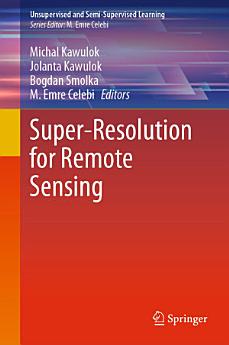Super-Resolution for Remote Sensing
eBook 정보
저자 정보
Michal Kawulok, M.Sc. (2003), Ph.D. (2007), D.Sc. (2015) is a Professor at the Silesian University of Technology (Gliwice, Poland). He has been involved in numerous successfully completed projects in both academia and industry, and recently has led projects related with super-resolution reconstruction of satellite images, funded by European Space Agency and executed at KP Labs (Gliwice, Poland). Prof. Kawulok has published over 150 papers in peer-reviewed journals and conference proceedings on pattern recognition and image processing. His general research interests are concerned with image processing, pattern recognition and machine learning, with particular attention given to super-resolution reconstruction, face and gesture recognition, linear and non-linear dimensionality reduction techniques, and support vector machines. He is a senior member of the IEEE.
Jolanta Kawulok received the Eng., M.Sc., and Ph.D. degrees in 2009, 2010, and 2015, respectively, from the Faculty of Automatic Control, Electronics and Computer Science, Silesian University of Technology, Gliwice, Poland. Currently she is an Assistant Professor in the Department of Algorithmics and Software at the Silesian University of Technology. Her main research interests include data mining, image processing, genome sequence analysis, metagenomics, and biomedical data analysis.
Bogdan Smolka received the Diploma in Physics degree from the Silesian University, Katowice, Poland, in 1986 and the PhD degree in Computer Science from the Department of Automatic Control, Silesian University of Technology, Gliwice, Poland, in 1998. In 2007, he was promoted to Professor. He has published over 300 papers on digital signal and image processing in refereed journals and conference proceedings. His current research interests include low-level color image processing, human-computer interaction, visual aspects of image quality and applications of artificial intelligence in computer vision. His impact factor according to the Web of Science is 19 and he is in the top 2% of the most influential scientists according to the evaluation performed by Stanford University, Elsevier and SciTech Strategies.
M. Emre Celebi received his B.Sc. degree in Computer Engineering from the Middle East Technical University (Ankara, Turkey) in 2002. He received his M.Sc. and Ph.D. degrees in Computer Science and Engineering from the University of Texas at Arlington (Arlington, TX, USA) in 2003 and 2006, respectively. He is currently a Professor and the Chair of the Department of Computer Science and Engineering at the University of Central Arkansas. Dr. Celebi has actively pursued research in image processing/analysis and data mining with an emphasis on medical image analysis, color image processing, and partitional clustering. He has worked on several projects funded by the US National Science Foundation and the US National Institutes of Health and published over 160 articles in reputable journals and conference proceedings. As of June 2024, his work has received over 17,000 citations with an h-index of 59 (Google Scholar). He is a senior member of the IEEE (since 2011) and a fellow of the SPIE (since 2021).




